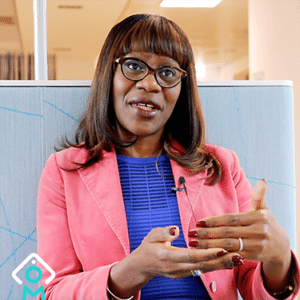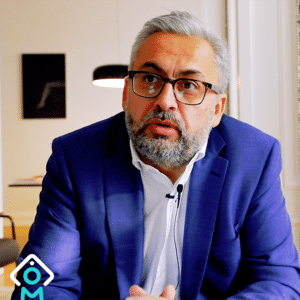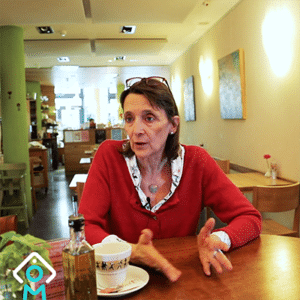Dropping everything to make you passion your job
In this Meet an entrepreneur video, Céline Camara, Professional actor and improvisation trainer, shares with us how she decided to make her passion her job:
- From employee to entrepreneur
- The reactions of those around you
- The courage to take the plunge
- Steps to getting started
- Having a “passion job”
Find all the information about Céline on the actors.lu website.
You liked this content?Share it now!
Bookworm? Read the transcript!
Transcription de l'intervention de Céline Camara
What’s great about a passion job is that you believe in what you’re doing. I put my guts into it and I know why I get up in the morning.
Dropping everything to make you passion your job
Céline Camara
Professional actor and improvisation trainer since 2018
From employee to entrepreneur
Just to give a bit of context, I went to law school. I started working as a salaried doctoral student, so I was writing my thesis, and at the same time, I was giving some law classes at the university in Luxembourg and in Nancy. We prepared conferences, etc. About a year after that, after I arrived here, I wanted to meet people who weren’t lawyers, so I was looking for an activity and I had discovered improvisation when I was a senior in high school, around 18 years old. I hadn’t done any since, but it was something I had really enjoyed. So I found a small association here called Pôle Impro Luxembourg, “The POIL” and I joined them. And I went head over heels for the art form itself as well as the world of improvisation. There were psychologists, teachers, Luxembourgers, Belgians, French people… and it started to become a huge part of my life. We organized shows, we played, we traveled in France, Belgium, Switzerland. And since my job was pretty flexible – I had to do what I had to do, but I didn’t have a very strict schedule – improv started to take more and more space. I wasn’t getting anywhere with my thesis, and it came to a point where I was exhausted, because I couldn’t work anymore, all I could think about was improv. So I went to therapy because I was unwell. And during therapy, I realized that I hadn’t actually made a choice. Why was I in law? I didn’t really know. I thought about what I really wanted to do, and that’s how I decided to quit law.
The reactions of those around you
Reactions were really very good. Of course, certain people more or less close to you who project in their minds too when they hear about such a big change, something about it makes them question what they’re doing in their lives. But I had people I didn’t know very well cry in my arms saying: “That’s great! Live your life. It’s something I could never do.” Then others who’d say: “But what will you do? Financially? And bla and bla.”
The courage to take the plunge
I think that for me, that failure, because it is a failure for me not to have finished my thesis that I’m perfectly OK with, but that failure was fundamental. I had never in my life experienced such serious difficulties academically, professionally, or ultimately personally. And I think I needed to be in that complete abyss to ask myself: “OK, who are you?” “What are you doing?” “What do you feel like doing?” So clearly, I’m convinced that if I hadn’t gone through with the failure of my thesis, I wouldn’t be here today.
Steps to getting started
I was looking at a model, you could say, as a trainer in theatrical improvisation, actor and workshop leader in the company that I was going to join, as well as just improvising, performing on stage, maybe acting in plays… Then again, I wanted to find a balance between providing training, because that’s what allows you to live, to have a regular income, while trying to continue to learn the acting profession myself, work on my acting skills. I had to become independent here, so I took the “Fit for Entrepreneurship” training at the time, which is organized in partnership with the Adem. We had classes in accounting, marketing, all that… I was thrilled because I love school, so I was taking my notes and everything. We had exams at the end. Plus, I hate math and I got a great grade in accounting and it made me feel better, because really, I told myself: “I’m going to become an improv actor and trainer and I can see that there’s accounting, you have to manage your budgets.” It takes a lot of time, so it was very reassuring to have that overview of it all. Something else that was very nice was that we had themed workshops and also a tutor, so someone who followed us, mostly in creating some sort of business plan. And so, I had an actor who is also a trainer and coach, who accompanied me. It was good for learning about some real details of the job here in Luxembourg, where I didn’t know anyone or not many people at the time.
Having a “passion job”
What’s great about a passion job is that you believe in what you’re doing. I put my guts into it and I know why I get up in the morning. It’s hard to explain but it’s just great because it’s a lot of work, but it’s so very enjoyable! That’s really what’s great about it, because it makes me feel good as a person too. And the disadvantages are that since we love what we do very much, we don’t count. And so, the fact that you don’t count means it overflows on all sides. I think it’s something that’s very common when you become an entrepreneur, whether it’s a passion job or not. But there’s a side where you don’t count your hours, so I actually work all the time, or practically. There’s also the difficulty of pairing it with a family life, a private life, where you don’t necessarily work the same hours. And also, to keep doing other things, because at the end of the day, it’s a passion job so it really takes up all the room, everywhere. You might have fewer hobbies, and there you go, it’s something like that.





